Research, Teamwork, Success!
December 2022 graduates and third place winners of the
Minorities Poster Session at the American Society for Cell Biology, 2022,
B. Drake R. Alton, biochemistry and Michael Anaafi, zoology
February 3rd, 2023
Drake Alton, December 2022 Weber State biochemistry graduate recalls,
"Honestly, my hopes weren’t high for winning an award. There was a split second where I considered not going to the ceremony at all. I knew Michael and I performed well, but I saw the huge posters from schools like Stanford, Yale, and Hopkins… I wasn’t sure if we were up to their level. When they were through with announcing the honorable mentions and got to the top three awards, they said, 'This year, the third place award goes to a team of two students…' In that moment, I let myself have a glimmer of hope. I thought, 'Could that be us?' When I heard them say our names, I was really shocked. I jumped up, grabbed Michael, and we ran to the podium to accept our award."
Michael Anaafi, December 2022 zoology graduate reverberates his teammate's response to winning 3rd place in the Minorities Poster Session at the American Society for Cell Bio 2022 conference in Washington, DC, stating,
"Winning an award never crossed my mind until I heard the judge announce that the third place winner was actually the work of two students. At that moment I imagined how great it would feel to be recognized. The second I heard our names called, I turned over to Drake and Dr. Trask speechless wondering if I misheard the judges. After we’ve accepted the award, I was still in disbelief, and I personally don’t think it hit me until after we got back home. Attending and participating in this massive conference was already a big enough accomplishment for us. I remember during the competition, I was flattered to be competing against students from Ivy League schools. Their posters were all rich with information."
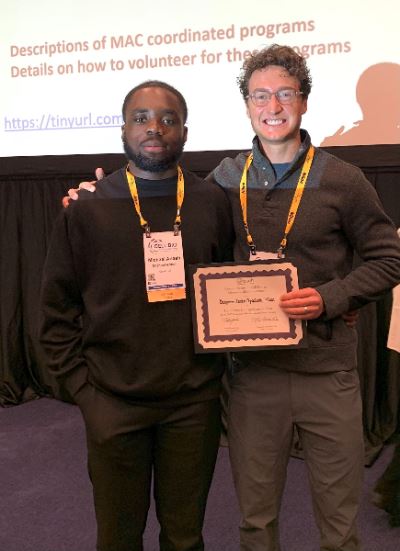 In disbelief they express, "We never thought we’d be visiting Smithsonian museums, talking with Holocaust survivors, or eating fabulous Mediterranean food in the nation’s capitol with our professor!" And yet, with the support of their zoology faculty mentor, Associate Dean Barbara Trask, Ph.D., and funding for travel received from the American Society for Cell Biology (ASCB), the WSU Office of Undergraduate Research, and the Department of Zoology, this "dream team" share their story of research, teamwork and success!
In disbelief they express, "We never thought we’d be visiting Smithsonian museums, talking with Holocaust survivors, or eating fabulous Mediterranean food in the nation’s capitol with our professor!" And yet, with the support of their zoology faculty mentor, Associate Dean Barbara Trask, Ph.D., and funding for travel received from the American Society for Cell Biology (ASCB), the WSU Office of Undergraduate Research, and the Department of Zoology, this "dream team" share their story of research, teamwork and success!
Here’s how they got there:
The beginning:
Drake: Michael and I first met when we were in the same O-Chem I lab group in the Fall of 2020. Although we remained friends afterwards, neither of us ever imagined we would be doing research together, much less flying across the country to present our project at a large national conference. I had been working with Dr. Trask on my project since Fall of 2021, but there were other related areas of research that she also wanted to explore.
Michael: Dr. Trask asked me if I was interested in working on a research project last spring. I was hesitant at first because of all of the other commitments I already had, but after hearing Drake was involved, I was ecstatic and couldn’t say no.
The research:
Drake: We both focused on how metformin, a diabetic drug, affects the activation of metastatic genes in a couple of aggressive breast cancer cell lines. The genes I focused on are involved in recruiting white blood cells to the tumor site which plays a role in the progression of the cancer.
Michael: The genes I focused on are known as matrix metalloproteinases (MMPs), which are responsible for the destruction of the material that surrounds tumors. Cancer cells can either recruit white blood cells to destroy this surrounding material (what Drake was looking at), or they can produce MMPs and do it themselves (my project).
The process:
Drake: The example that sticks out in my mind happened when we were about to print out the final draft of our poster. After putting all of the data together, Michael and I wanted to run one final experiment so we could feel more confident in our results. Michael went back to campus at 10pm–after classes and then after volunteering in Salt Lake–to run the final experiment. The results of that experiment were included on our poster a few days later. I told this story to one of the judges of the poster competition and she was really impressed by the fact that we were working on our project up to the last possible minute! These are the kinds of successes I would have never been able to have on my own.
Michael: What I remember the most is how our schedules NEVER coordinated while working in the lab. However, we worked effectively ‘together but separate’ by each of us picking up where the other last left off in our lab. A LOT of emails and texts were shared, too.
The payoff!
Drake: Traveling to D.C. with Michael and Dr. Trask will be an experience I’ll never forget. The competition was heavy; many of the award winners were from large, prestigious institutions. But when they announced our names as the third place winners, I think we were all shocked to see that we could compete with the best when working as a team!
Michael: Working together on this project has taught me the value of teamwork in a scientific setting; that lesson will be useful for years to come. We were also both honored to receive the reward of winning 3rd place in a national poster competition! And of course, the opportunity to experience and travel to Washington D.C. with my good friend and my amazing professor.
Why collaborate?
Drake: Science isn’t meant to be done alone. I think Michael and I could have both been successful in carrying out this project on our own, but learning how to communicate and work together in the lab is perhaps more beneficial to our future careers in medicine and science than any of the laboratory techniques we learned.
Michael: Presenting at this conference was a shared goal for both of us from the start. Drake and I were both capable of completing this project separately. However, I don’t think we each could’ve ended up with the same results in the end (winning 3rd place!). Besides, I knew Drake would be a cool guy to work with, and it would be more fun to do it together.
Final advice?
Drake: I would say that letting your lab mate’s ideas flow freely is key to doing research as a team. Michael was so easy and fun to work with because he was always open-minded and never restrictive. I believe this mutual support for each other’s research goals and ideas was key to our success. Research is about curiosity and discovery so never lose that concept as a team.
Michael: Whoever came up with the phrase: “teamwork makes the dream work” is being serious. I believe there’s no collaboration without communication. Effective communication can create a “hive mind” that can be leveraged to complete a more successful project together. I believe we were so successful because we simply knew how to talk to each other. So my advice: find someone who you communicate well with and team up!
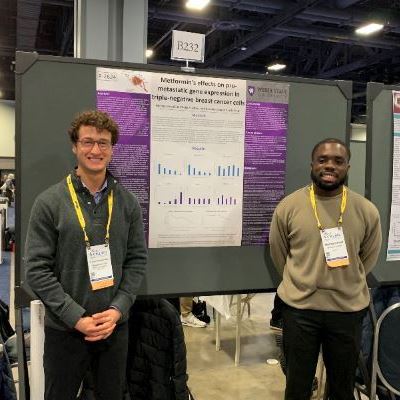
Drake and Michael share their winning research results at the poster session at ASCB '22.
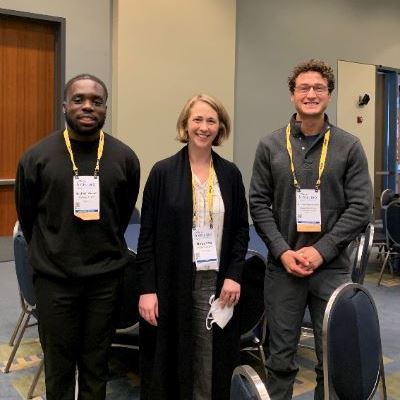
Drake and Michael received congratulations from Dr. Rebecca Alvania, CEO of the ASCB.
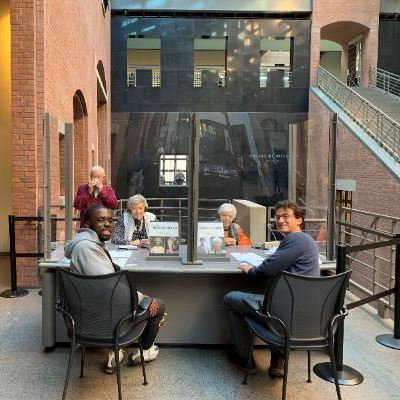
Conversations with Holocaust Survivors in the U.S. Holocaust Memorial Museum (one of 3 museums we visited that day)!
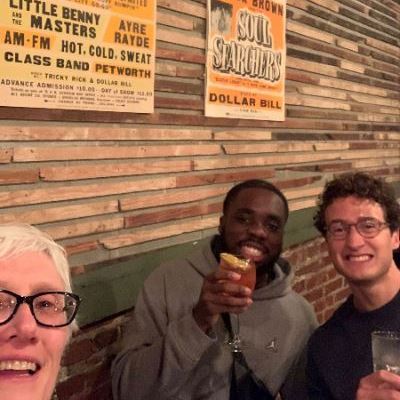
Celebrating the win and enjoying the nation's capitol together.
Content Integrator:
Ali Miller, College of Science
marketing and communications manager
amiller@weber.edu
For more information:
Associate Dean Barb Trask, College of Science
professor of zoology
website